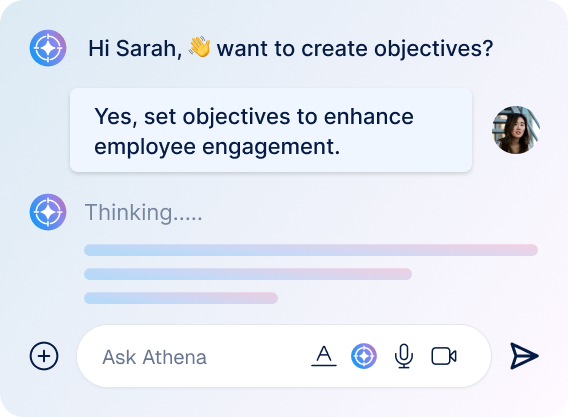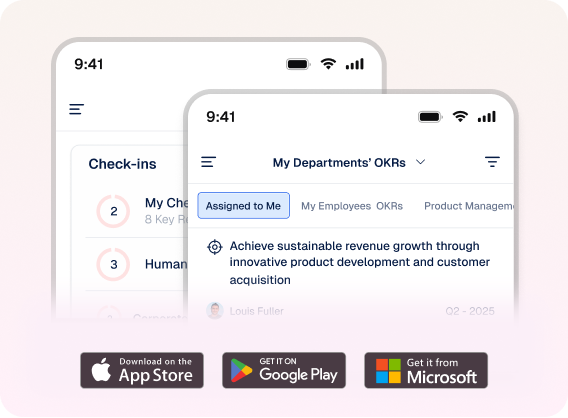OKR feedback
An organization needs to have a vision and the means to achieve it. Realizing a vision requires setting goals and achieving them on a consistent basis. This enables the business to gradually and systematically progress toward the overall long-term objectives, and hence the vision of the organization. In order to set goals and achieve them like clockwork, there is a need for a robust system that connects goal-setting at every level to the desired overall outcomes of the organization. Objectives and Key Results (OKR) serves this purpose. But for OKRs to function as intended, review and good feedback are essential, because this is the way OKR works.
OKR goal-setting and the challenges
OKR is a goal-setting framework that lets you track goals and outcomes. It enables organizations to set ambitious objectives and enables achievement through the alignment of the workforce across the organization to the overall objectives. These objectives are set by the management and they are cascaded down to teams as team-level OKRs, which then filter down to individual OKRs and vice versa.
OKR goal-setting by design takes focus away from tasks and places emphasis on outcomes that every team needs to deliver to achieve the organization’s overall objectives. As a result, the managers do not assign tasks; instead, it is the responsibility of individuals to set their own individual OKRs in line with the team goals. It creates a competitive mindset, where employees aspire to take up higher targets than their peers every time and set greater benchmarks, thus accelerating the progress of the team towards its goals. So employees are ultimately responsible for creating outcomes that lead to the achievement of team OKRs and the organization’s ambitious objectives.
This creates a major challenge, as there is a greater chance of employees losing direction and working towards the wrong priorities. This is where good OKR feedback and review come in. The role of the manager is to constantly review the goals and give OKR feedback so that the team progresses in the right direction toward the objectives
Book a free demo with our team to learn more about how OKR software can optimize your organization’s performance!

Importance of OKR feedback
Reviewing goals and giving feedback is crucial for the OKR framework to function smoothly. OKR feedback helps in the following ways.
Tracking progress towards the goals: Feedback and review help to track the progress of individuals and teams towards their respective goals and ensure that they are achieved on time. This process is backed up by data tracking and analysis on the OKR system.
Identifying challenges and problems: Problem-solving is part of OKR feedback. When employees take up ambitious OKRs, it is natural to hit snags and face massive challenges. Different individuals may deal with the same problems in different ways. OKR feedback helps to share workarounds and solutions from different individuals and identify the best way to deal with a problem. The managers can also give their input and support the team members in finding solutions. For instance, if there is a need to allocate additional resources to implement a solution for a major hurdle, the team manager has to convince the top-level management. But for that, it is indispensable to discuss with the team and make sure that the solution works and is viable. Sometimes the problem could be a lack of buy-in. Feedback from the team members is important for the managers to determine the reasons , make necessary changes, and convince the team to achieve buy-in.
Adjusting and adapting: OKR feedback helps to assess, adjust and adapt to changing conditions and challenges. It helps to explore alternative ways to achieve the objectives when a plan does not work out. It helps understand the problems better and get input from all the team members. Sometimes, the change of plans may require revising the goals themselves, necessitating a revamp of the methods to achieve them, or finding solutions and workarounds to any challenges or issues.
Communicating developments with the team: Things change fast in a fast-paced work environment. OKR success relies on alignment and adaptation. OKR feedback and review help to keep the team informed about progress towards team goals and any changes to the plan. It helps to make sure that every employee has a uniform understanding of the changes. It ensures that every individual in the team is working towards the same objectives and the team has a shared understanding of the organization’s priorities. This goes a long way in ensuring agility and success in a challenging business environment.
Mutual learning and collective progress: OKR feedback helps identify what works and what doesn’t. OKR feedback promotes continuous collective learning as a team from individual feedback, success stories, and best practices. This helps the team become more resilient and successful.
Attaining motivation and competitive mindset: OKR feedback keeps the team engaged and motivated, by connecting the impact of their work to the organization’s success in achieving its goals. It further shows insights into how every individual contributes to the team goals, creating healthy competition amongst team members and encouraging them to push the benchmarks higher.
Building trust and transparency: OKR feedback puts everything in the open and creates transparency concerning how an individual carries out tasks, tackles challenges, and achieves his/her goals, thus promoting open and honest communication on a regular basis. It promotes trust, creates a culture of OKR transparency and enables everyone to work together as a team toward achieving team goals.
We all need people who will give us feedback. That’s how we improve
How to give good OKR feedback
OKR feedback needs to have certain qualities. It should be:
Specific: The feedback should be very specific and clear of any ambiguities. It should be supported by examples. It should mention the progress the team has made in the review period toward the team OKRs. It should also mention the challenges faced by the team, how they were/will be overcome and the role of the individual in achieving team goals.
Backed with data: The feedback should be backed by data and relevant metrics. It should be devoid of mere opinions or anecdotes.
Objective: The feedback should be free from personal biases and false judgments of team members based on past experiences and prejudices. It can be avoided by purely following the inferences from the data and facts.
Timely: OKR feedback should be provided as soon as relevant events have occurred. Holding it up until the end of the OKR cycle can make the feedback redundant and far less useful.
Open to discussion: The feedback should be bi-directional, and the team members have to share their perspectives, ideas, and the challenges they face while receiving feedback from the manager. It should encourage open and honest dialogue on the OKRs.
When OKR feedback has these qualities, it will tend to be effective and helpful for the employees and the team.
How can you collect OKR continuous feedback?
In the OKR framework, the feedback needs to be continuous. OKR Continuous feedback can be given through various means, such as regular check-ins, team meetings, or using a project management tool to track progress.
OKR feedback example
A digital marketing team member may receive the following OKR feedback from his/her manager.
“We set out as a team to get 100,000 new leads and find 5,000 new customers this month. While we managed to achieve the target number of leads, we could convert only 4800 of them into our customers.
As a social media manager, you have posted two posts per day on average and generated 12000 inquiries through the social media channel. According to the sales team, only 470 of them achieved conversion, while your target is 500. Overall, this is more or less consistent with what we could achieve as a team.
While this is a temporary setback, I believe you can improve this and achieve the targets by the end of the quarter. On a positive note, you have exceeded the target of 10000 when it comes to lead generation.
I can infer that the cart abandonment rate has increased by 8%. The sales channel reports that at least 5% of lost opportunities in conversion are because the customers have spent in the holiday season and they are reluctant to spend now. We expect this situation to get better this month. However, we need to overachieve this month and the next to achieve the quarterly OKRs.
One thing you can focus on is pushing some offers through the social media channel. The chance of conversion is expected to improve significantly when offers are introduced. This is evident because while the projected sales numbers of standalone products have not met the targets, the combo offerings have been a hit. By promoting more value-for-money combos, we can achieve the quarterly targets. We will discuss this with the team further.
If you have any suggestions or ideas, or if you had any problems at the individual level, you can share them.”
In this example, the feedback is specific, timely, and focuses on the progress towards the individual and team OKRs, and the challenges faced. It is appreciative of where the employee has performed well and identifies the setbacks. All these are based on factual data. The feedback also provides suggestions on how the specific employee as well as the team address the challenges. It also encourages open and honest communication.
Based on the OKR feedback the following revised OKRs could be set for the digital marketing team:
Objective 1: Increase customer conversion rate
Key Result 1: Convert at least 500 of the 12000 inquiries generated through social media into customers
Key Result 2: Reduce cart abandonment rate by at least 5%
Objective 2: Increase sales through value-for-money offerings
Key Result 1: Increase combo product sales by 15%
Key Result 2: Introduce at least 3 new value-for-money combo offerings
Objective 3: Achieve quarterly targets
Key Result 1: Achieve 100,000 new leads and 5,000 new customers by the end of the quarter
Key Result 2: Overachieve on monthly targets for the next two months to ensure quarterly targets are met
Top 5 questions that managers should ask team members to get the best OKR continuous feedback
Since OKR continuous feedback is mainstreamed into normal conversations, it is essential for managers to ask the right questions to kickstart OKR feedback as a part of mundane conversations. Following are some questions that can help kickstart review and OKR feedback.
What are your OKR achievements and the positives from this week?
What has been your challenge in achieving your OKRs?
What kind of support would you need from me to achieve your OKRs effectively and consistently?
What progress have you made with regard to your career or personal goals this week?
Do you have any feedback about the strategic goals of the company?
Frequently Asked Questions on OKR Feedback
1. How do I give feedback on OKRs?
OKR feedback should be specific, clear, based on data and facts, objective, timely and open to discussion.
2. What is an OKR review?
OKR review is the process of tracking and reviewing the progress that individuals and the team as a whole have made against their respective goals.
3. How do you evaluate OKRs?
OKRs are evaluated based on pre-defined data points and relevant metrics that determine the success and failure of the OKRs. For example, success of a sales executive may be measured based on the sales metrics such as sales targets, monthly sales bookings, average purchase value, monthly calls per sales rep, etc.
Conclusion
OKR feedback plays a important role in improving performance. It can help individuals and organizations understand how their OKR programme is faring and it provides them with information on what they need to improve. However, it is important to ensure that feedback is delivered effectively, in a supportive and actionable manner, to maximize its positive impact on performance.
OKR feedback plays an important role in improving performance. It helps individuals and organizations understand the performance of their OKR program and provide information on areas for improvement. However, it is important to ensure that feedback is provided in an effective, supportive, and actionable way to maximize its positive impact on performance., to maximize its positive impact on performance.
Book a free demo with our team to learn more about how OKR software can optimize your organization’s performance!




